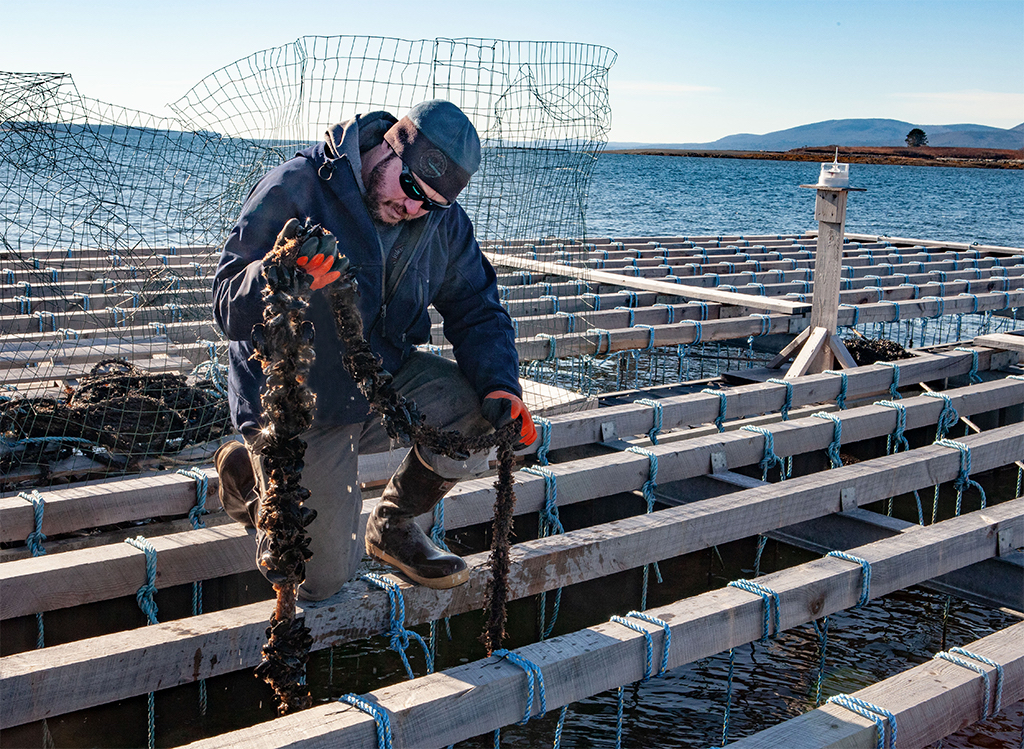Earlier this fall, we caught up with Josh and Shey Conover, owners of Islesboro Marine and founders of Marshall Cove Aquaculture. Shey worked at the Island Institute from 2004-2017, and we helped her and Josh start their mussel farm on the northwest side of Islesboro through the second round of our Aquaculture Business Development program in 2016. Since then, they have expanded their work and took a moment to fill us in on their upcoming plans.
How did you first become interested in mussels?
JOSH: I first got interested in high school doing science projects for mussels. Then, in college, Great Eastern Mussel had opportunities to help you get a lease site, application, and funding if you sold your mussels to them for several years. The paperwork never happened, but I was always really interested in doing mussels. I realized Shey was interested in it, and it definitely makes it a lot easier when your wife is interested in something too!
How did that transition into starting your own new business, Marshall Cove Aquaculture?
SHEY: We had a lot of equipment here in the boatyard that was sitting for six months out of the year and not being used, and Josh is always looking for an excuse to work on the water. When we first got the boatyard, a couple of positions were largely seasonal. Expanding into aquaculture means more year-round, full-time work for everyone.
Where has the mussel business taken you since you started?
SHEY: Really, we are on a long curve—it takes 18 to 24 months to get mussels to market. The first year we didn’t have a great seed set. We got a great seed set last summer, so we are now in the ramp-up stage for our business.
JOSH: If you don’t get the seed set, you can’t create the product until the next year. That’s why we are lucky we have other parts of our business to rely on. We built six rafts the first year. We built the first three for seed collection and then put three more in for the fall. We got a new lease site in March 2018 by Flat Island, west of Islesboro, and then we added three more rafts this spring.
What keeps you motivated about mussels?
JOSH: It’s just fun, and I get to be out on the water. It’s a learning experience though. We just hash out our ideas, come up with a plan, and go do it. If it doesn’t work, we try to figure it out again and do it again. It’s the best way to learn—instead of having somebody just tell you how to do it and doing it their way.
Did anyone give you a hand with design, or did you just pull people in as you needed them?
JOSH: We got help from a couple growers in Casco Bay who helped with design and sourcing materials. When you’re working on a new problem, it’s nice to be able to give folks a call who have been doing this longer than you.
How did your involvement with the Island Institute’s Aquaculture Business Development program help you with your business?
Making introductions with existing farmers was key. We already had the lease worked out and had developed relationships with our business partners, but being able to take part in things like Industry Day in Portland and meet other growers was great. We’ve been able to scale up fast, and it’s those relationships that have helped us move things along.
You have several marine businesses—lobster, grower, distributor, and boatyard—which one do you like best?
JOSH: They all have their positives. When I get tired of hauling traps at some point, then I can work at the boatyard or go work on the mussels. When I get tired of doing that, then I can haul more traps!
SHEY: When I worked at the Island Institute, there was always something new and different to do and learn from. I like that there is the same kind of diversity in this work, and that I can be actively involved with our businesses. Whether it’s helping the mussel farm going through the lease process or the HACCP training (Hazard Analysis and Critical Control Points process for food safety), it’s interesting to have a more hands-on perspective now. Before, I was removed from those things for a number of years and just thinking more theoretically about the work.
What are your plans for the future?
SHEY: We plan to put a new building on the boatyard for a retail market/processing center, and we’re working on getting our wholesale shellfish dealers license. Having these new plans is a major motivator. The main thing for us was to try to keep everyone employed full time, and we thought that it would be really neat to create a new industry on the island rather than just doing more of the same seasonal/summer type of work. We feel like we are effectively creating a whole new set of jobs for the island community, and that feels good.


